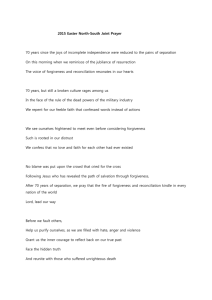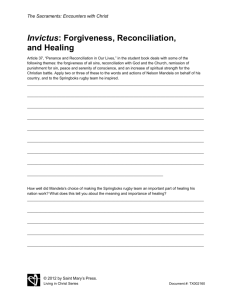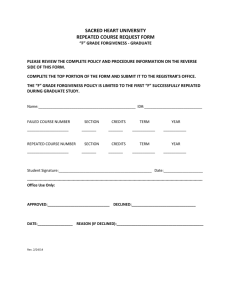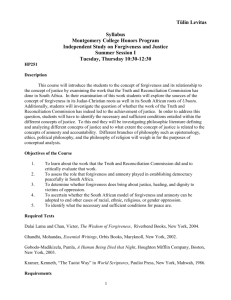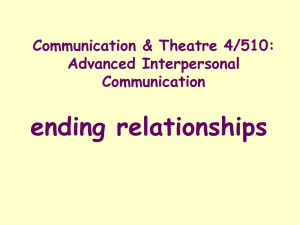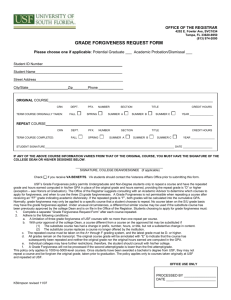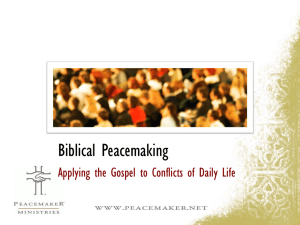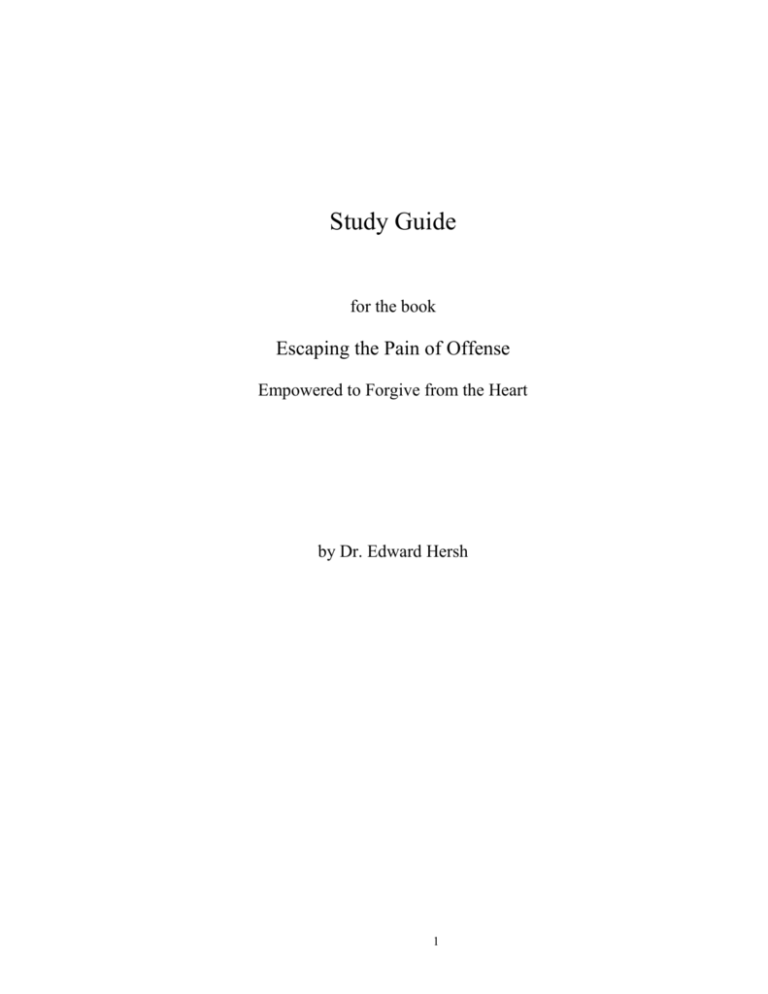
Study Guide
for the book
Escaping the Pain of Offense
Empowered to Forgive from the Heart
by Dr. Edward Hersh
1
Copyright © 2011 by Edward Hersh
All rights reserved.
All scripture quotations, unless otherwise indicated, are
taken from the Holy Bible, New International Version®,
NIV®. Copyright ©1973, 1978, 1984 by Biblica, Inc. ™
Used by permission of Zondervan. All rights reserved
worldwide.
Published by Edward Hersh
Find out more about the Blue Rock BnB Healing Ministry at:
http://healing.bluerockbnb.com
Contact Ed at; 72 Blue Rock Road, Millersville, PA 17551
Ph: 717-872-7440
email: hosts@bluerockbnb.com
Discussion about the contents of the book is continued at the author's blog:
http://authoredhersh.blogspot.com .
2
CONTENTS of the STUDY GUIDE
Comments and Cautions for Group Study
Within each Session below are listed the sections of the Escaping the Pain of Offense book
that are covered in the respective study session (based on 10 sessions).
Session One
Beginning Part One of the book
Foreword by Dr. Robert Doe
Preface
Chapter 1 — Introduction: The Cycle of Offense
Follow–up and Practice for Part One – Foundations
Session Two
Chapter 2 — Forgiveness: Misunderstandings
Follow–up and Practice for Part One – Foundations
Session Three
Chapter 3 — Forgiveness: Divinely Initiated
Follow–up and Practice for Part One – Foundations
Session Four
Beginning Part Two of the book
Chapter 4 — Forgiveness: Receiving God’s Gift
Follow–up and Practice for Part Two – Transformational Healing
Session Five
Chapter 5 — Forgiveness: Surrendering to God
Follow–up and Practice for Part Two – Transformational Healing
Session Six
Chapter 6 — Forgiveness: Trusting God for Change
Follow–up and Practice for Part Two – Transformational Healing
Session Seven
Beginning Part Three of the book
Chapter 7 — Forgiveness and Reconciliation
Follow–up and Practice for Part Three – Conflict Resolution
Session Eight
Chapter 8 — Reconciliation in Relationships
Follow–up and Practice for Part Three – Conflict Resolution
Session Nine
Chapter 9 — Conclusion Part I
Follow–up and Practice for Part Three – Conflict Resolution
Session Ten
Chapter 9 — Conclusion Part II
3
Follow–up and Practice for Part Three – Conflict Resolution
Appendix A – Resources and sample prayers
Appendix B – Author’s Personal Story and Healing Journey
Appendix C – Overcoming an Abortion
4
Comments and Cautions for Group Study
Study Groups reading Escaping the Pain of Offense: Empowered to Forgive from the Heart
can benefit greatly through accompanying the content with discussion and prayer support.
The text in each chapter and the follow-up and practice content at the end of each Part can
serve as the basis for exploring the topic of forgiveness together in a group setting. The
number of sessions allowed to process through the book can vary depending on the goals and
objectives for outcomes. For example, a very brief overview can be achieved in three
sessions with each of the three Parts of the book become the subject of a session. Six sessions
could be used to split the material in six parts. Eight sessions would require splitting the
material in eight parts, and so forth. This guide is based on a ten session study.
A word of caution: Although more thorough examination of the material can yield deeper
heart level transformation, members of a group should not be made to feel compelled to
conform to a particular practice. Remember, forgiveness is first getting your heart right with
God. This is an intensely “personal” matter, and individuals must be given space to process
their own stuff with God. “Peer pressure” should not be used in any way to make people
respond in a certain manner. Remember the “peeling and onion” illustration? Some members
of a group may be ready to peel more than others. Some may be ready to yield their hearts to
deeper levels of transformation. Each individual’s willingness, or unwillingness, to expose
their heart in a group setting must be respected.
In addition to the caution expressed above, the Group Facilitator’s judgment will need to be
exercised as to the specifics of how the group sessions are structured and executed. The
author of this guide is assuming the Facilitator has a working understanding of group
dynamics and is able to discern between healthy and unhealthy (holy and unholy) interactions
of group members.
5
Session One — Introduction
Beginning Part One of the book — Foundations
Read the Following:
Foreword by Dr. Robert Doe
Preface
Chapter 1 — Introduction: The Cycle of Offense
Follow–up and Practice for Part One – Foundations
Some Key Points:
1. From the Foreword we see that the government of God (“kingdom of God”) includes
transformational healing as a key component. God is all about healing, and earthly
governmental structures can best serve their people when favorability is extended to Godcentered approaches to healing. From the broadest perspectives of our society’s ability to
function well, the health of a person’s inner being is a core element.
2. The Preface extends this point with illustrations of how individuals’ lack of selfgovernment and lack of honoring God’s government can mess up many people’s lives.
Mankind’s desperate condition of helplessness to change without divine intervention becomes
increasingly more real the closer a tragedy strikes to personal and family circumstances.
3. In Chapter 1, what the author calls the Cycle of Offense is introduced. From a Christian
worldview perspective, without God’s intervention mankind is hopelessly imprisoned in a
broken world characterized by sin and transgression.
4. Sessions One, Two, and Three include the Follow-up and Practice for Part One –
Foundations. For Session One, the main purpose for examining this material is to help you
examine your thoughts and feelings about God. It’s hardly possible to have a God-centered
approach to topics in the book without God being at the center of your life. This book
assumes the reader already has a basic understanding of what it means to follow Christ.
Becoming a disciple of Christ is the first step in growing in relationship to Father God and
receiving the empowerment to forgive from the heart.
Session One Reflection and Discussion Questions
1. What are your thoughts and feelings about the Foreword of the book? Describe any similar
examples/ circumstances in your personal/church/community life?
2. What are your thoughts and feelings about the Preface of the book?
Describe any similar examples/circumstances in your personal/church/community life?
3. Is God the center of your life? Do you want Him to be the center? Who is Jesus to you?
4. Describe/evaluate your relationship with God, past and present. How has your relationship
improved from when you first believed? What would you like to see improve?
6
5. As you read the verses in Isaiah 61 quoted at the beginning of Chapter One, how does it stir
your heart?
6. Where has been, or where is the cycle of offense active in your life? Explain the events and
your responses. Who or what might be stuck in unforgiveness?
7 When you are hurt, do you instinctively blame others? Do you blame yourself? Do you
retaliate or ruminate? List examples.
7
Session Two — Forgiveness: Misunderstandings
Read the Following:
Chapter 2 — Forgiveness: Misunderstandings
Follow–up and Practice for Part One – Foundations
Some Key Points:
1. Biblical truth and Christians’ belief and practice (in the Church in America) sometimes
seem to be on an increasingly divergent path. Personal problems and relational conflict
are fruits of doubt and unbelief evidenced in many Christians’ lifestyles.
2. Forgiveness is one of the most important topics of which many Christians have lost clear
focus. Examining what forgiveness is not, can help clarify what forgiveness is.
3. In order for a forgiveness intervention to be most successful in a Christian’s mental health
treatment and spiritual growth, understanding and applying a God-centered approach which
emphasizes the finished work of Christ and progressive sanctification affords the most fruitful
results.
Session Two Reflection and Discussion Questions
1. How has the lack of understanding and practice of forgiveness kept you in bondage?
Explain the circumstances or describe the relationship results.
2. In what settings or under what circumstances do you have most difficulty recognizing
your need to change? What forms of denial might be at work in these situations? (e.g.
simple denial, minimizing, blaming, excusing, generalizing, dodging, or attacking etc.).
3. Are you rarely, sometimes, often, usually, or always (pick one) ready to allow your
friend(s) to point out your blind spots? Explain.
4. What forms of ungodly “control” might you be confusing with the godly kind of selfdiscipline and self-control commanded in the Bible? In what ways might you be “the
master of your fate,” instead of trusting God as Refuge and Lord?
5. By reading this section, what area(s) of misunderstanding have you uncovered about
forgiveness? How do you now see it?
6. In what ways are you “hard on yourself”? Use the cycle of offense to describe how you
might become trapped by self-doubt, self-condemnation, self-blame, “false” guilt, or selfrejection.
7. What is your understanding of the term “absolute truth”? How do your beliefs about God
factor into your answer?
8. In general, are you satisfied with your current level of biblical knowledge? What could you
8
do (and willing to do) to become better informed?
9
Session Three — Forgiveness: Divinely Initiated
Read the Following:
Chapter 3 — Forgiveness: Divinely Initiated
Follow–up and Practice for Part One – Foundations
Some Key Points:
1. Forgiveness is God’s idea. Honoring God's authority in our lives must include our
surrender to his purpose and plan regarding forgiveness.
2. Forgiveness has a historical context in the Creation, Fall, Redemption, and Consummated
World.
3. Jesus is the Savior, providing both perfect justice and perfect mercy for mankind. The
death and resurrection of Christ has accomplished forgiveness. Christ’s work is based in
Father’s love and now carried out by the Holy Spirit (in cooperation with mankind).
Session Three Reflection and Discussion Questions
1. Explain what it means to say, “Christ has accomplished forgiveness.”
2. Explain John 20:21-23. Also read the larger context. Again Jesus said, “Peace be with
you! As the Father has sent me, I am sending you.” And with that he breathed on them
and said, “Receive the Holy Spirit. If you forgive anyone his sins, they are forgiven; if
you do not forgive them, they are not forgiven.”
3. Reflecting on the Scripture references and points discussed in Chapter 3, name some of the
things you discovered (or re-discovered) that encourage you the most about God’s initiation
of forgiveness.
4. How is a God-centered view of forgiveness set apart from other ways of looking at
forgiveness?
5. Reflecting on the historical aspects of the life and work of Christ, can you think of Old
Testament examples of “types” of Christ? Explain. How might these help us in our
understanding and practice of forgiveness in our current times?
6. What amazes you the most about God being perfect justice and perfect mercy at the same
time?
7. How does God define love? Explain how a person’s perception of God factors into their
ability to love.
10
Session Four — Forgiveness: Receiving God’s Gift
Beginning Part Two — Transformational Healing:
A Personal Matter between Man and God
Read the Following:
Chapter 4 — Forgiveness: Receiving God’s Gift
Follow–up and Practice for Part Two – Transformational Healing
Some Key Points:
1. Two theological terms deserve clarification; justification and sanctification. The author
focuses on sanctification as a key element of forgiveness, and forgiveness as a key element of
sanctification.
2. Many mental health conditions often have spiritual and emotional roots, and research
shows that even many physical problems are rooted in emotional and mental health issues.
Emotions are neither good nor bad, and they can be a powerful tool in exposing and clearing
up faulty thinking patterns.
3. Knowing about forgiveness is not enough; one must experience forgiveness. To practice
God-centered forgiveness, one must know the Forgiver. Our heart perceptions of God
determine our ability to receive His healing touch.
4. A person’s honesty and humility (regarding self) are at the center of heart transformation
towards forgiveness.
Session Four Reflection and Discussion Questions
1. What is the difference between “healthiness” and “wholeness”?
2. What is the difference between “being sorry” and repenting? Site examples.
3. What is the difference between a conversion experience and being sanctified? What does
this look like in your own life?
4. Reflect on Ephesians 2:8-10; What are these verses saying? What are they saying to you?
How can you apply them? “For it is by grace you have been saved, through faith—and this
not from yourselves, it is the gift of God—not by works, so that no one can boast. For we are
God’s workmanship, created in Christ Jesus to do good works, which God prepared in
advance for us to do.”
5. Do you make a conscious effort to define your feelings; on a scale of 1 to 10 (1 being
never and 10 being always)? Explain. What are some of the feelings you feel most often?
6. Emotions are messengers carrying a message. Explain.
11
7. What is the difference between feelings and emotions? How do your feelings feed your
emotional responses?
8. Provide some examples of how feelings and emotions are expressed in the Psalms (see
Psalm reference sheet in Appendix A). Also identify in the Bible some examples of how
Jesus handles feelings and emotions.
9. Other than childhood trauma, what difficult situations have you faced in life, and how
have you overcome? Have you/ how have you seen God intervene on your behalf?
10. How difficult is it for you to “draw near” to God? What are some barriers of drawing
closer?
11. Practice allowing your emotions to identify the source of pain, lie believed causing the
pain, and the truth Jesus is speaking to bring healing. (See Basic Memory Healing Prayer
sample in Appendix A.)
12. In what areas of your life do you suspect that denial is most active? How does pride keep
you from being honest with yourself?
12
Session Five — Forgiveness: Surrendering to God
Read the Following:
Chapter 5 — Forgiveness: Surrendering to God
Follow–up and Practice for Part Two – Transformational Healing
Some Key Points:
1. The essence of forgiveness is yielding to God and releasing the offense. It is surrendering
to God the right to judge a matter or reclaim debt. Forgiveness offers release to those
oppressed by the sin of rejecting God’s intervention and glorifying self. Yielding the offense
to God and surrendering the offender to His judgment is the only way to free a Christian from
holding (and re-making) an ungodly “judgment” that causes bitterness and resentment.
2. Sanctification affects both the physical and nonphysical parts of the human being. In everincreasing measure, believers should become “obedient from the heart.”
3. Releasing offenses is an important part of whole person healing from a medical and
therapeutic viewpoint. Neglecting the emotional part of a person’s being can have damaging
consequences. Toxic stress leads to a host of medical and psychological problems.
4. Jesus did not keep the power to heal and deliver to Himself; He empowered His disciples to
practice it also.
Session Five Reflection and Discussion Questions
1. Do you tend to be intellectually driven or emotionally driven? Explain. How might you
become more balanced?
2. What stands in the way of you being more of a “whole person” at the present time? What
needs to happen to remove that obstacle?
3. Describe the situation and why it has been so hard for you to forgive someone in your life.
Write about the hurt, pain, and damage it has brought into your life.
4. Do you rehearse (in your mind) “speeches” you would like to give to someone? Do you
try to avoid that person? Describe the feelings you have and what you would like to say to
them.
5. Explain what it means for Christ to accomplish forgiveness (for the situation above).
6. List your major resentment. How is it interfering with your life? List situations where you
became angry because of your resentments.
7. We often have a strong need to be in control. We overreact to change over which we have
no control. In what area of your life do you experience the strongest need to be in control?
What do you fear when you’re not in control? What do you feel?
13
8. What specific behavior(s) is a problem you have been avoiding? Or what behavior are you
defending or excusing? How do you do this? What causes you to know that you must turn
your will and your life over to the care of God in this area? What steps will you take to
turn it over?
14
Session Six — Forgiveness: Trusting God for Change
Read the Following:
Chapter 6 — Forgiveness: Trusting God for Change
Follow–up and Practice for Part Two – Transformational Healing
Some Key Points:
1. Critical judgments are the root of unforgiveness in a person’s heart and unresolved conflict
in relationships.
2. Forgiveness is both an event and a journey.
3. Emotions are messengers. When the message is painful, the pain should be engaged to find
its true source and healing of the wound.
4. Bad fruit (undesirable behavior) comes from a bad root (undesired, hidden source).
Problematic critical judgments made in the present are usually rooted in past ungodly
responses and patterns formed through repetition.
5. Father God’s love is the source, power, and vehicle of forgiveness. God (as he relates to
mankind) is all about forgiveness, and forgiveness is all about God (John 3:16-17).
Session Six Reflection and Discussion Questions
1. Read and study Luke 6:43-45. Explain what it means. “No good tree bears bad fruit, nor
does a bad tree bear good fruit. Each tree is recognized by its own fruit. People do not
pick figs from thornbushes, or grapes from briers. The good man brings good things out
of the good stored up in his heart, and the evil man brings evil things out of the evil stored
up in his heart. For out of the overflow of his heart his mouth speaks.”
2. Are you able to discern any repetitious (and undesirable) results in events or relationships
in your life? What pattern(s) of “dysfunction” might be most evident?
3. Explain at least one positive example and at least one negative example of the principle of
“sowing and reaping” in your life.
4. Describe any unwanted fruit (negative patterns in relationships) that you feel might be
connected to a bitter root from your childhood (ages 0-6 or 6-12).
5. Do you recall a condemning judgment of a parent/primary caretaker? Until now you have
forgotten the judgment. It may even be a surprise to you when you connect the seed that
was sown back then and the influence of this root on the fruit (behaviors) in your life
today. Describe the root and the fruit as you see the connection.
(Example: Your father was in the military and at times was away for months. You judged
him for not being there for you like other fathers. While you were proud of him, at the
15
same time you were angry with him. Your being proud of him tipped the scales in
choosing to marry a workaholic. Now you project the angry judgment against your father
onto your husband. This anger now acts to drive your husband to be away even more than
he normally would be.)
6. Think of some inner promises (vows) you have made in the past that are still affecting
your thoughts and attitudes presently. How have these affected specific relationships in
your life and what changes would help correct the damage?
7. Toward whom or what do you feel bitterness, anger, rage, or other forms of malice? What
opinion(s) (perhaps resulting from expectations) you have made about their behavior, and
how have these translated into judgments about who they are as a person(s)?
8. Have you experienced serious trauma or abuse by a close friend or relative as a child?
Have you received some healing? What still needs to happen to get closer to where you
think God may want to take you in the healing process?
9. What anxieties do you have about memories of your past?
10. Healing is a journey. Explain.
11. Which area from your childhood needs the most mending (e.g., trust, play, relationships,
fear, emotions, faith, etc.)? Explain.
12. Anger, hate, and rage do not “just happen.” Jesus points this out in Matthew 5:21-22.
“You have heard that it was said to the people long ago, ‘Do not murder,[a] and anyone who
murders will be subject to judgment.’ But I tell you that anyone who is angry with his
brother[b] will be subject to judgment. Again, anyone who says to his brother, ‘Raca’ is
answerable to the Sanhedrin. But anyone who says, ‘You fool!’ will be in danger of the fire of
hell.” Also read in context.
Explain how “critical judgments” are at the root of what Christ is teaching in these verses.
16
Session Seven — Forgiveness and Reconciliation
Beginning Part Three — Conflict Resolution:
An Interpersonal Matter Between God, Man, and Fellowman
Read the Following:
Chapter 7 — Forgiveness and Reconciliation
Follow–up and Practice for Part Three – Conflict Resolution
Some Key Points:
1. Forgiveness and reconciliation are inevitable experiences in worthwhile interpersonal
relationships, stirred by conflict and testing of character in an irreparably (humanly speaking)
broken world.
2. Love, as defined by God, is what our relationships with people should be based on. God’s
love for us is the model.
3. Forgiveness must not be confused with reconciliation. “Forgiveness is about me;
reconciliation is about us.”
4. In the similar manner that repentance and confession are keys in reconciling oneself to
God, repentance and confession are crucial in reconciliation with fellowman.
Session Seven Reflection and Discussion Questions
1. Meditate on Jeremiah 2:13 and surrounding verses. Write down your interpretation.
2. How hard is it for you to say “I was wrong?” What blessings have you missed out of by
being “non–teachable” in this regard?
3. What was your picture of God in your growing up years? How has it changed and how do
you see God now?
4. On a scale of 1 to 10 (1 being never; 10 being always); Can God be trusted? What would
it take for God to be trusted one notch higher (e.g. if 5, what would make it 6) Are you
trusting Christ to remove your dysfunction (sin), or are you relying on your own
willpower to change? Explain.
5. We draw near to God in order to know his desires for us and to know how we can please
him. Explain how you are drawing near to God (e.g., through devotions, worship, prayer,
fellowship, journaling, meditations, etc.).
6. In your relationship with _____________(problem person), have you made assumptions
about them that are incorrect; ungodly; unhealthy for them or for you? Explain the source
and what you can do to get free.
17
7. Looking back on some of the most fruitful relationships in your life, how has conflict
(differences or disagreements) worked for the good? List and explain.
8. Explain your thoughts about 1 John 4:19-21. “We love because he first loved us. If
anyone says, “I love God,” yet hates his brother, he is a liar. For anyone who does not love his
brother, whom he has seen, cannot love God, whom he has not seen. And he has given us this
command: Whoever loves God must also love his brother.”
9. The Cycle of Offense described in Chapter 1, states that we become an offender (to keep
the cycle going). We sometimes offend other people (or even ourselves), but our greatest
offense is against God. Explain how 1 John 4:19-21 confirms that offending God is our
greatest problem; even bigger than offending people.
18
Session Eight — Reconciliation in Relationships
Read the Following:
Chapter 8 — Reconciliation in Relationships
Follow-up and Practice for Part Three – Conflict Resolution
Some Key Points:
1. Our hearts are the wellsprings of all our thoughts, desires, words, and actions. Therefore, it
is also the source of our conflicts. Bible passages presented here describe the root cause of
conflict, which is unmet desires in our hearts.
2. Family and intergenerational transmission of sin is a major source of root issues. This does
not preclude personal responsibility for each person to examine him or herself and allow God
to extract the bad roots.
3. Marriage, Church, and Community all present unique challenges and opportunities to
practice forgiveness and reconciliation.
4. Culture plays a key role in maturity of relationship. Acknowledgement and ownership of
values and beliefs makes the way for genuine communication to occur. On both ends of
sending and receiving a message, values and beliefs impact interpretation of verbal and
nonverbal interactions. The same honesty and humility discussed earlier as it applies to
individuals taking responsibility for their own part of an offense, is applicable in a cultural
context as well.
Session Eight Reflection and Discussion Questions
1. Explain how your religious (Church) experience may have reinforced your tendency to
deny your need for healing. When people cannot be transparent, how does it affect the Body
of Christ?
2. What particular character/behavior traits (both positive and negative) have been present in
your family line? How have these affected your life to this point?
3. Are there any “family secrets” that you are aware of that others are not, or that you feel
are being withheld from your knowledge? Explain. Examine the hurt and ask God if He
would have you play any role in healing. (Caution: be careful and KNOW it is God
before you act on anything!)
4. Have you wrongly “judged” one or both of your parents; grandparents; sibling(s)? What
might you still be “reaping” from these judgments, and what does God want you to do
about it?
5. On a scale of 1 to 10 (1 being never and 10 being always) how easy do you think it is for
you to discern a cultural difference when you are trying to communicate with someone but
neither of you seems to be getting through? Explain your answer.
19
6. Do you regularly hang out with people of different race, ethnicity, social status etc.? Why,
or why not? Is there a particular group of people you fear getting to know, more than
others? Why? What would it take to overcome your separation from another people
group(s)?
7. Have you witnessed prejudice in any way from anyone/group? Describe your feelings. How
can you be part of the solution instead of perpetuating the problem?
8. How have “cultural” (people group) assumptions and faulty thinking in regards to “culture”
impacted your life? What culture(s)?
9. Try to identify some “strong holds” in your thinking patterns that hinder relating to other
people in a godly manner. What is the source and what judgments may be attached to
these?
10. Are you a good listener? Do you know someone who is a good listener? What makes this
person a good listener, and in general, what defines a good listener? What can you change
to become a better listener?
11. Are you aware of the personality differences between you and your closest friend(s)?
What are these differences, and what difference do they make on your outlook on life?
How do they factor in your interpretation of your friend’s actions, and your friend’s
interpretation of your actions?
12. How could you become a better communicator? What would your friend(s) say would
make you a better communicator?
13. Recall a supportive/mentor relationship you’ve had in the past. Describe at least one
important aspect of that relationship experience.
14. How might the victim/predator cycle described in Part One apply to the discussion of
inter-group tensions regarding perceived rights of a group (discussion in Chapter Eight
section called Cultural Unforgiveness)?
20
Session Nine — Conclusions Part I
Read the Following:
Chapter 9 — Conclusion – Part I
Follow-up and Practice for Part Three – Conflict Resolution
Some Key Points:
1. Four key themes guide the content of this book. The first is the redemptive plan of God;
second, the centrality of Jesus Christ; third, practicing the elements of forgiveness; and four,
paving the way for reconciliation and conflict resolution.
2. Every aspect of forgiveness is focused on God and His love.
3. The Church, as a diverse family of God’s people and as a community centered in God’s
love, must learn to allow cultural and theological differences to unite rather than divide.
4. Forgiveness involves three main components: the Gift, the choice, and the fruit (i.e. Jesus
as God’s Gift of love, our choice to surrender, and the human experience that follows).
Session Nine Reflection and Discussion Questions
1. What are some important things to keep in mind when helping another person pray through
their inner struggles?
2. Using the life song repertoire analogy discussed at the end of Chapter Eight, explain how
practicing forgiveness demonstrates a life growing in Christ-likeness. How might this
become a “cultural” phenomena in a Christian’s personal relationship with God?
3. Is forgiveness a) a gift, b) a choice, c) an emotion, d) all of the above? If the answer is d:
all of these three elements, explain why you would agree or disagree.
4. For the Christian, is forgiveness an “option”? Resolve your answer with 1 John 4:19-20.
5. Explain how the practice of forgiveness and reconciliation witnesses Christ’s love to the
world.
6. Drawing from your experience, how could the Church (in America) demonstrate better
practices of respecting and honoring people of diverse backgrounds and cultures? What
evidence/examples of this respect have you already witnessed?
Review or revisit any unanswered questions from previous sessions.
21
Session Ten — Conclusions Part II
Read the Following:
Chapter 9 — Conclusion – Part II
Follow-up and Practice for Part Three – Conflict Resolution
Appendix A – Resources and sample prayers
Appendix B – Author’s Personal Story and Healing Journey
Appendix C – Overcoming an Abortion
Some Key Points:
1. Continue unfinished points from Session Nine
2. The Appendices in the book Escaping the Pain of Offense contain some resources to help
work through specific issues on the healing journey.
3. Make this as personal as possible to apply what you have learned and to allow God to
continue to change your heart towards the goal of closer fellowship with Him and other
people.
4. If some of the questions in the Study are too difficult or too probing, return to the material
sometime within a year. An increased awareness and practice of these themes can help
measure your spiritual growth. Refer to Appendix B for more on the author's personal story of
healing. You may want to seek a Christian counselor to help further process through a place
you become stuck.
Session Ten Reflection and Discussion Questions
1. Which of the resources (in the Appendices) have you found most helpful and why?
2. Reflecting back over the entire study, what part(s) have impacted you the most? Explain.
3. How has this study changed your life (as compared to before reading the book)?
a. In what ways is your understanding and practice of forgiveness different?
b. What fruit is evident in your relationship with God and others, and how you
view yourself?
4. What area(s) do you need to review and revisit? Why? When will you do this?
5. Are you ready to seek the help of a trusted friend or counselor to process further or obtain
their perspective on your progress?
6. Do you need to see a doctor to rule out a medical explanation for problems you are
experiencing?
7. Are you trusting the God of the Bible as your “primary physician”?
a. Is Father God the primary One in whom you find your identity, protection, and
provision?
22
b. Is Jesus your primary source of companionship and communication?
c. Is the Holy Spirit your Chief comforter, nurturer, and teacher?
Review or revisit any unanswered questions from previous sessions.
23

